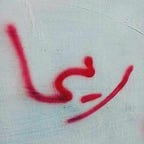At Al-Quds University, a Pledge to Marwan Barghouti Made Nine Years Ago
As he enters his 20th year in Israeli jails on charges of leading the Al-Aqsa Martyrs’ Brigade (the armed wing of the Fatah movement), many Palestinians are still turning their eyes toward Marwan Barghouti, a Palestinian Fatah Central Committee member and lawmaker, to lead them out of the quagmire of Oslo and the Zionist colonization and occupation of Palestine.
Nine years ago in April 2012, I was teaching at Al-Quds University when then President Sari Nusseibeh spoke at a seminar held on campus about the inspiration, hope and sumoud that Barghouti’s resistance represented in the Fatah movement, and indeed, his place in that movement. He anticipated Barghouti’s announcement that he would run in the legislative elections, along with the movement’s dismissed leader Nasser Al-Qudwa. Nusseibeh believed that Barghouti holds the key to Fatah’s future.
Nusseibeh spoke of a vision of one democratic country in historic Palestine led by Marwan Barghouti.
Following are a few pictures, on campus and in Abu Dis, that I took of the event nine years ago.
It’s important to remember that Fatah’s armed activity was the dominant vision during Yasser Arafat’s time in office. It receded after Marwan Barghouti’s imprisonment, contrary to that vision, which viewed the Palestinian struggle for the 1967 territories as requiring the use of arms against Israeli forces and settlers. Israel’s actions since Arafat’s death (or was it assassination?) has only emphasized the truth of this assessment. Barghouti, therefore, is the most appropriate choice for heading a popularly-empowered Palestinian Authority, especially given his popularity and the history this seminar at AQU highlighted in 2012.
ALSO READ: Palestinian Elections Hope to De-Zionize Palestine
“In the end, neither Israeli elections nor Palestinian elections are about ‘democracy.’ In Israel, they are all about entrenching the Zionist regime in Palestine from the river to the sea; in the occupied territories, they are all about liberation and de-Zionization.”
________________________
Rima Najjar is a Palestinian whose father’s side of the family comes from the forcibly depopulated village of Lifta on the western outskirts of Jerusalem and whose mother’s side of the family is from Ijzim, south of Haifa. She is an activist, researcher and retired professor of English literature, Al-Quds University, occupied West Bank.
